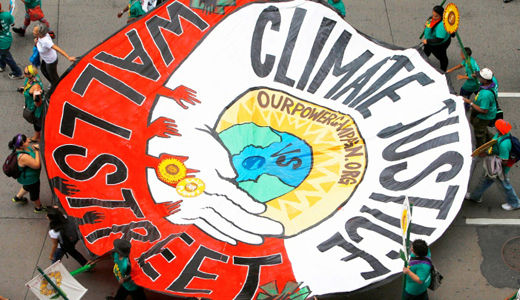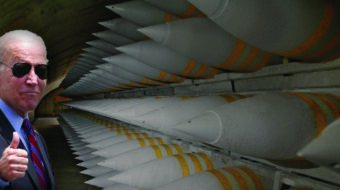
This may sound like the rant of a half-crazed street-corner preacher prophesying the end of the world, but a takeover of the presidency by the Republicans in November and their retention of a majority in Congress could set our nation and the globe on a potentially catastrophic course.
Right now, it appears the Republican side is unraveling, possibly putting in play not only the presidency but also the Senate and perhaps the House. But the fierce battle for control of the federal government – and the nation’s direction – is volatile and, like sand, ever-shifting.
Almost absent so far from the Republican side of the debate in this election is the most consequential issue of all time – global climate change.
In an extensive March 21 interview with the Washington Post editorial board, Donald Trump parroted the line of the climate deniers: “I think there’s a change in weather…but I’m not a great believer in man-made climate change.” It’s a repeat of a message he (and other Republicans) have been promoting for years. In numerous tweets going back to 2012, Trump has unequivocally characterized human-caused climate change as a “hoax.”
For his part, Republican contender Senator Ted Cruz told the Texas Tribune last year that “global warming alarmists are the equivalent of the flat-Earthers.” He added, “You know it used to be accepted scientific wisdom the Earth is flat, and this heretic Galileo was branded a denier.” Climate change denial, then, is apparently a badge of honor these days.
If not for the seriousness of the subject, this could easily qualify for a skit on Saturday Night Live.
Presenting a different image from that of his competitors, Ohio Governor John Kasich says he acknowledges human-created climate change. His practice, however, tells a different story.
Last October, Kasich’s administration committed Ohio to joining with 25 other mostly Republican-led state governments to sue the Environmental Protection Agency (EPA) over the requirement that states slash greenhouse gas pollution emitted by coal-powered electric plants – the nation’s biggest source of such emissions.
The EPA’s action is the cornerstone of President Obama’s national plan to curtail greenhouse gas emissions and demonstrate to the world the U.S.’ commitment to contain global warming.
With this initiative, the president also hoped to encourage the world’s nations to take meaningful action to cut greenhouse gas emissions in the lead-up to the United Nations Climate Change Conference (COP21) in Paris last December.
At the time, both Kasich and Trump discredited the president’s efforts and the climate conference on the basis, as Trump put it on his Instagram, that “While the world is in turmoil and falling apart in so many different ways, especially with ISIS, our president is worried about global warming.”
Trump characterized remarks delivered by Obama at the Paris conference as being among the “dumbest statements” in politics. Other then-Republican presidential contenders joined the chorus of criticism, including New Jersey Governor Chris Christie, Florida Senator Marco Rubio, and former Florida Governor Jeb Bush.
Meanwhile, Republican House Speaker Paul Ryan, while feigning disinterest in the presidency, appears to be positioning himself for consideration in the event of a contested GOP convention in July. He led the House Republican majority, with a few Democrats from coal states, in passing two resolutions to scuttle the EPA’s power-plant rule in early December. Under Mitch McConnell’s leadership, the Republican Senate majority had acted similarly a few days earlier. (The president subsequently vetoed the bills).
Meanwhile, President Obama and Chinese President Xi Jinping will be the first two heads of state to officially sign the climate agreement on April 22 at the United Nations in New York. As leaders of the two largest greenhouse gas emitters, they are sending a signal to the rest of the world’s leaders to join them. Countries have a year to sign, and after 55 nations do so, the accord will officially be enacted.
The agreement is widely viewed as a feat of historic proportions but significantly short of what’s needed to keep the climate from spiraling out of control. The good news is that both of the two Democratic presidential contenders have expressed strong support for continuing and even improving on the president’s environmental agenda.
But that welcoming news has one giant hitch. The accord will require close monitoring, unprecedented international cooperation, and even more consequential action by the world community in the near future.
Hardly what can be expected from a Republican administration and Republican-dominated Congress. The whole Republican pack is shamelessly doing the political bidding of the energy giants.
Even if Democrats come out on top in November, fulfilling the accord’s goals will still be a daunting task. Not least will be countering the opposition of a powerful cabal including the transnational fossil fuel industry, the political likes of the Koch brothers and other far-right think tanks and ideologues, as well as sections of Wall Street and allied reactionary interests like the military-industrial complex.
In the final analysis, the U.S. Supreme Court will most likely decide whether to sustain or overturn the president’s rule to cut emissions from coal-fired power plants, now being challenged by 29 mostly Republican-led states and supported by 18 other Democratic-controlled ones.
With the nation’s highest court now evenly divided between liberal and conservative justices, chances are that the person who fills the late Antonin Scalia’s vacancy will effectively swing the court to the right or the left. And most likely, the decision on who takes that seat will be made by the incoming president and Senate.
So, all three branches of the federal government are in play, and with that, the fate of our nation’s willingness to fulfill the Paris climate accord (which, in turn, may well influence the readiness of other nations to sign on and do their part).
This really isn’t the best time for such political uncertainty.
On March 22, the team led by preeminent climate scientist James E. Hansen released a new study showing the drastically increased likelihood of devastating storms stronger than any in modern times, as well as the disintegration of large parts of the polar ice sheets. The study warns that a sharp rise of the seas will overtake earth before the end of the century – much faster than previously thought.
Unless aggressive measures are taken rapidly to combat global warming, Hansen said, “That would mean loss of all coastal cities, most of the world’s large cities and all their history.”
Hansen, who first brought the issue to national and world attention in 1988 when he warned Congress that global warming had already begun, added, “We’re in danger of handing young people a situation that’s out of their control.”
In a separate study published March 30, two scientists – David Pollard, a researcher at Pennsylvania State University, and Robert M. DeConto of the University of Massachusetts – independently came to similar conclusions.
This is an extraordinary moment requiring extraordinary approaches.
While they conduct an energetic debate, the political forces being brought into play by the Democratic presidential candidacies of Hillary Clinton and Bernie Sanders must do so in a spirit of unity against a common foe.
They must emerge from the convention united and ready to expand into a grand coalition that will win over a much larger share of the electorate going into November, including new and infrequent voters.
This includes engaging in a battle of ideas to win over whites and men influenced by racism, sexism, jingoism, and other backward ideas, as well as those considering not voting or, even worse, voting for Trump if their Democratic favorite is not nominated.
The path to November is anything but sure, as is the journey to a sustainable world order.
For now, all out to November for the sake of Mother Earth and humanity’s future!
Photo: People’s Climate March, September 21, 2014. Jason DeCrow | AP












Comments